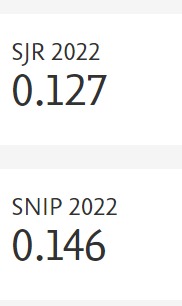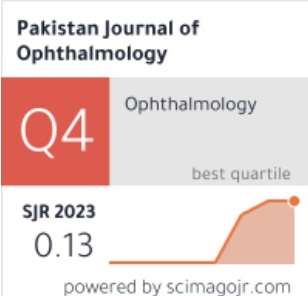Anatomical and Functional Outcome of Rectangular Three Snip Punctoplasty in Primary Acquired Punctal Stenosis in a Tertiary Care Hospital of Karachi
http://doi.org/10.36351/pjo.v37i2.1166
DOI:
https://doi.org/10.36351/pjo.v37i2.1166Keywords:
Epiphora, Primary acquired punctual stenosis, Punctoplasty, Munk score.Abstract
Purpose: To find out the anatomical and functional outcomes of rectangular three-snip punctoplasty in primary acquired punctal stenosis.
Study Design: Quasi Experimental study.
Place and Duration of Study: Isra Postgraduate Institute of Ophthalmology, Karachi, from July to December 2020.
Methods: Patients of age 50 years and above, from either gender with primary acquired punctal stenosis of any grade (0-5) presenting with epiphora were recruited from Oculoplasty Outpatient department. Punctal stenosis with secondary causes like lesion on or around punctum or lacrimal drainage system and history of surgery or radiotherapy, lower canalicular or common canalicular stenosis were excluded from the study. Punctal stenosis was graded by Kashkouli scale and epiphora by the Munk score. After local anesthesia, two vertical cuts were given in the posterior wall of the punctum and a third cut was given horizontally to connect the vertical cuts. This resulted in a posterior ampullectomy. Syringing and probing was done to assess patency of the lower lacrimal drainage system. The patients were followed up for 6 months to assess for anatomical and functional success.
Results: At the end of six month anatomical success was achieved in 85% cases and functional success in 70% patients. Fifteen percent patients suffered re-stenosis of punctum.
Conclusion: Rectangular punctoplasty is a functionally successful procedure for treating primary acquired punctal stenosis. The anatomy is least distorted and long-term recurrence rate is also low.
Key Words: Epiphora, Primary acquired punctual stenosis, Punctoplasty, Munk score.






